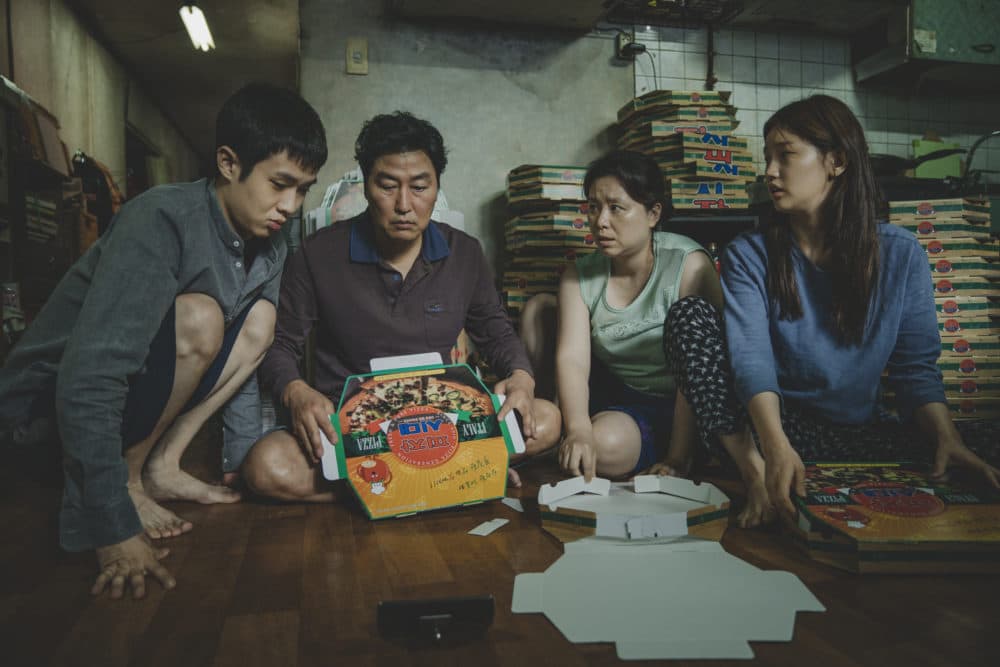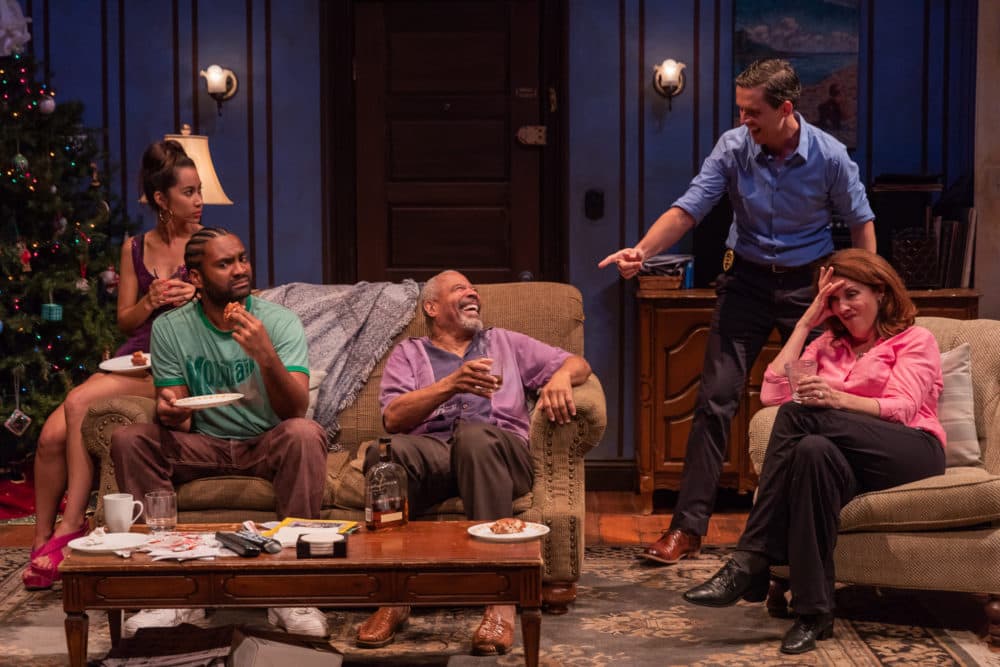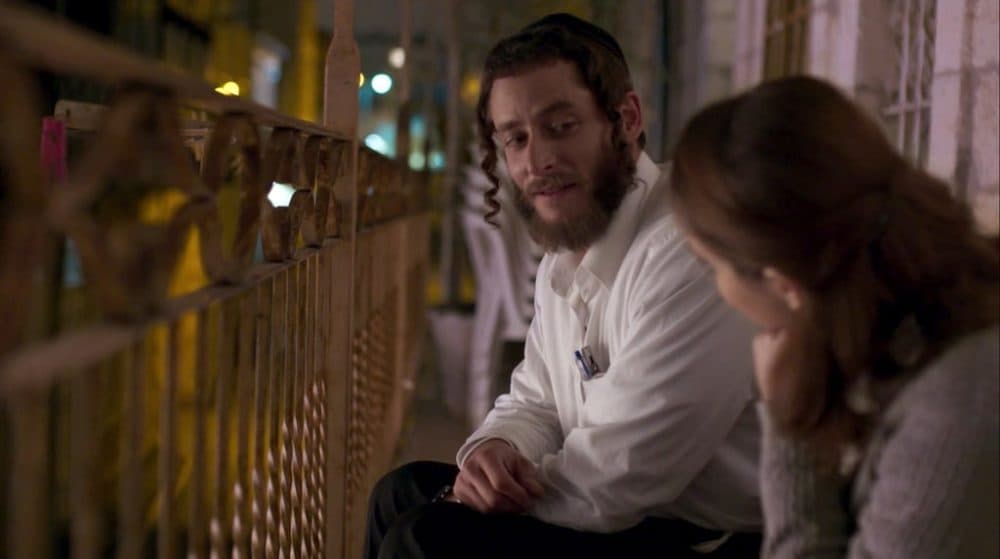Advertisement
Commentary
Boston Theater Needs To Start Offering Something No Screen Could Match
I’m going to say something that theater critics aren’t supposed to say: Lately I’ve been enjoying going to the movies a lot more than going to the theater.
Theater has had a special pull for me since I got my first goosebumps seeing “Annie Get Your Gun” and “South Pacific” at the South Shore Music Circus when I was in grade school. David Wheeler’s Theater Company of Boston’s brilliant stagings of modernist masterpieces thrilled me in college. That magnet was even stronger after I switched from television to theater criticism at the Boston Globe in the mid-‘90s. Lately, though, I’ve been feeling that pull to be resistible.
To be fair, it’s not every month that four of the greatest filmmakers in the world release new films: Pedro Almodóvar’s “Pain and Glory”; Bong Joon Ho’s “Parasite”; Martin Scorsese’s “The Irishman”; and François Ozon’s “By the Grace of God.” So it would be premature and probably inaccurate to declare a new day dawning in world cinema.
Still. All four movies deliver what I’d call a peak artistic experience. What in the world is that? It’s often out of this world, maybe even beyond words, a transcendental experience that leaves one weak at the knees or in awe of the artistic excellence or emotional impact of what’s just been witnessed.

As the fall theater season winds down, it disappoints me that I haven’t had any such peak artistic experiences in Boston area theater this year. David Byrne’s “American Utopia” at the Colonial and “Cambodian Rock Band” at the Merrimack Repertory Theatre came close, but “American Utopia” needed more of a thematic through line and the dialogue in “Cambodian Rock Band” was often a little too unsophisticated when it wasn’t talking about genocide. There were a number of other excellent productions this season including “SIX” at the American Repertory Theater; “Admissions” at SpeakEasy Stage Company; “My Fascination with Creepy Ladies” by Anthem Theatre Company; “The Purists” and “Rosencrantz & Guildenstern Are Dead” at the Huntington; “Nixon’s Nixon” at New Repertory Theatre.
So isn’t excellence good enough? And sharing a communal experience with live actors and audiences that aren’t siloed into popcorn-munching easy chairs? What more do I want?
Advertisement
What I want — not all of the time, but certainly some of the time — is to see a play or musical that makes me look at the world differently when I walk out of the theater. “Admissions” is certainly a provocative play and nicely staged by SpeakEasy, but its debate about the pros and cons of striving for diversity doesn’t tell me anything I didn’t know about the issue. I often get the sense that Boston theater, unlike New York or even Berkshires theater, is so obsessed with telling stories of the moment that they’re giving short shrift to stories meant to last.
What I want — not all of the time, but certainly some of the time — is to see a play or musical that makes me look at the world differently when I walk out of the theater.
Will people still be talking about “Admissions” and “SIX” 50 years from now? My guess is that unlike say, “A Raisin in the Sun” or “Caroline, or Change,” these shows don’t address their issues about diversity, empowerment and misogyny in a way that feels transcendent and timeless.
This year is a far cry from last fall, which was loaded: SpeakEasy’s “Between Riverside and Crazy”; A.R.T.’s “The Black Clown”; the Huntington’s “Man in the Ring”; ArtsEmerson’s import of “Measure for Measure”; and the long-awaited “Hamilton.” If you look, for example, at “Between Riverside and Crazy,” Stephen Adly Guirgis' play feels absolutely of the moment in terms of how it deals with multiculturalism and economic displacement, but is also hilariously written, thoroughly transporting, empathetic, scabrous and redemptive. Not unlike “Parasite.” And a great SpeakEasy production to boot. If I’m around in 50 years, I’d get off my deathbed to see this again.

I’m still thinking about the emotional and/or intellectual wallop of all of these productions a year later. This year feels more like a tap on the shoulder by contrast. Some of it can be attributed to accidents of timing, but the fact is that theaters often lead with their best in September and this year felt a little complacent.
Take another play I admired — Ronan Noone’s one-man play “the smuggler,” at Boston Playwrights’ Theatre, with the wonderful Billy Meleady in the title role of a writer so down on his luck that he turns to a life of violence and crime. Spoken in verse, no less. I chuckled at a lot of the rhymes and had sympathy for the devilish path that the character embarked on, despite the victims in his wake.
It was a far cry, though, from how Scorsese handled Frank Sheeran’s (Robert De Niro) similar pragmatic immorality in “The Irishman” or how Bong managed the twists and turns of the central impoverished family of con artists in “Parasite.” In the play and the two movies we’re presented with a world in which the only way to live the dream, American or Korean, is through crime, betrayal and stepping on the backs of others.
But even in an amoral universe there doesn’t seem like there’s that much at stake in “the smuggler” and everything seems to be at stake in those two films, politically and personally. In all four films, really, as “Pain and Glory” is about finding personal redemption through art and fellowship and “By the Grace of God” is a deeply sophisticated, humanistic look at the courage of French victims of child abuse risking everything by standing up to the reprehensible lack of attention by the Catholic Church.
Theater should be offering more than the movies and TV, not less.
I don’t mean to single out Noone's play. I’m a fan of his work, including this one. But it only served to solidify my dissatisfaction with this season of Boston theater. Theater should be offering more than the movies and TV, not less. And it’s not about the buckets of money that someone like Scorsese can throw at a film compared to the money available to local theater. God knows there are megamillion dollar movie disasters, but there are also one-man shows that I’ll never forget — like the Súgán Theatre Company’s one-man “St. Nicholas” from the ‘90s with Richard McElvain starring as Conor McPherson’s protagonist (a theater critic no less).
I could make the same argument about television vs. theater. There was recently a play at the New Repertory Theatre called “Trayf,” about the conflicts between orthodox and secular Jews. It was cute enough, but not one-tenth as satisfying as an Israeli TV comedy series on Netflix, “Shtisel,” that dealt with the same issue. And talk about peak artistic experiences — if you didn’t see the HBO series, “Our Boys,” an Israeli-Palestinian co-creation about the murder of a Palestinian boy and the tension it creates between Orthodox and secular Israelis, get thee to HBO On Demand. Have I been as moved in a Boston theater as I have on my couch watching Allen Ginsberg’s benediction in Scorsese’s Netflix film about Bob Dylan’s Rolling Thunder Revue or by Ken Burns’ storytelling on PBS’ “Country Music”? Not that I could remember.

I do think that Boston theater, at least since I’ve been covering it, goes through cycles of moving forward and then plateauing, and that part of the current plateau has to do with obsessing about the divisive politics of the moment. That should absolutely be part of the mission of theater in general and local theater companies in general. But let’s not lose the artistic forest through the political trees.
One of the undeniable peak artistic experiences in recent years was Dave Malloy and Rachel Chavkin’s “Natasha, Pierre & The Great Comet of 1812” at the American Repertory Theater in 2015. A.R.T. is premiering the same team’s “Moby-Dick” in December. And the Huntington is about to open “Quixote Nuevo” followed by Lynn Nottage’s Pulitzer Prize-winning “Sweat.”
I hope they all kick-start the theater season. By the end of 2020 I want to be eating my words and writing that local theater offers something that no other medium can match.
